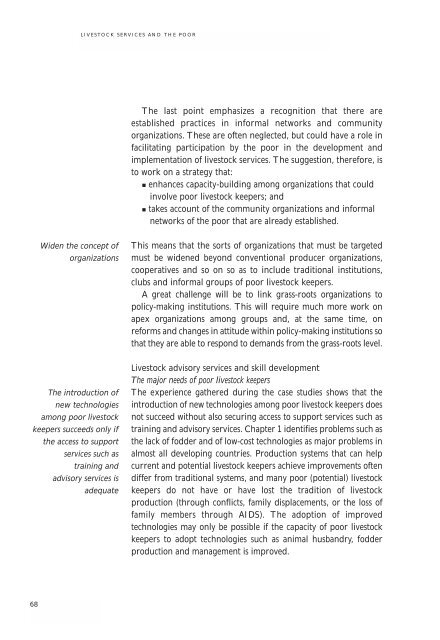Livestock Services and the Poor: A global initiative - IFAD
Livestock Services and the Poor: A global initiative - IFAD
Livestock Services and the Poor: A global initiative - IFAD
You also want an ePaper? Increase the reach of your titles
YUMPU automatically turns print PDFs into web optimized ePapers that Google loves.
Widen <strong>the</strong> concept of<br />
organizations<br />
The introduction of<br />
new technologies<br />
among poor livestock<br />
keepers succeeds only if<br />
<strong>the</strong> access to support<br />
services such as<br />
training <strong>and</strong><br />
advisory services is<br />
adequate<br />
68<br />
LIVESTOCK SERVICES AND THE POOR<br />
The last point emphasizes a recognition that <strong>the</strong>re are<br />
established practices in informal networks <strong>and</strong> community<br />
organizations. These are often neglected, but could have a role in<br />
facilitating participation by <strong>the</strong> poor in <strong>the</strong> development <strong>and</strong><br />
implementation of livestock services. The suggestion, <strong>the</strong>refore, is<br />
to work on a strategy that:<br />
enhances capacity-building among organizations that could<br />
involve poor livestock keepers; <strong>and</strong><br />
takes account of <strong>the</strong> community organizations <strong>and</strong> informal<br />
networks of <strong>the</strong> poor that are already established.<br />
This means that <strong>the</strong> sorts of organizations that must be targeted<br />
must be widened beyond conventional producer organizations,<br />
cooperatives <strong>and</strong> so on so as to include traditional institutions,<br />
clubs <strong>and</strong> informal groups of poor livestock keepers.<br />
A great challenge will be to link grass-roots organizations to<br />
policy-making institutions. This will require much more work on<br />
apex organizations among groups <strong>and</strong>, at <strong>the</strong> same time, on<br />
reforms <strong>and</strong> changes in attitude within policy-making institutions so<br />
that <strong>the</strong>y are able to respond to dem<strong>and</strong>s from <strong>the</strong> grass-roots level.<br />
<strong>Livestock</strong> advisory services <strong>and</strong> skill development<br />
The major needs of poor livestock keepers<br />
The experience ga<strong>the</strong>red during <strong>the</strong> case studies shows that <strong>the</strong><br />
introduction of new technologies among poor livestock keepers does<br />
not succeed without also securing access to support services such as<br />
training <strong>and</strong> advisory services. Chapter 1 identifies problems such as<br />
<strong>the</strong> lack of fodder <strong>and</strong> of low-cost technologies as major problems in<br />
almost all developing countries. Production systems that can help<br />
current <strong>and</strong> potential livestock keepers achieve improvements often<br />
differ from traditional systems, <strong>and</strong> many poor (potential) livestock<br />
keepers do not have or have lost <strong>the</strong> tradition of livestock<br />
production (through conflicts, family displacements, or <strong>the</strong> loss of<br />
family members through AIDS). The adoption of improved<br />
technologies may only be possible if <strong>the</strong> capacity of poor livestock<br />
keepers to adopt technologies such as animal husb<strong>and</strong>ry, fodder<br />
production <strong>and</strong> management is improved.

















